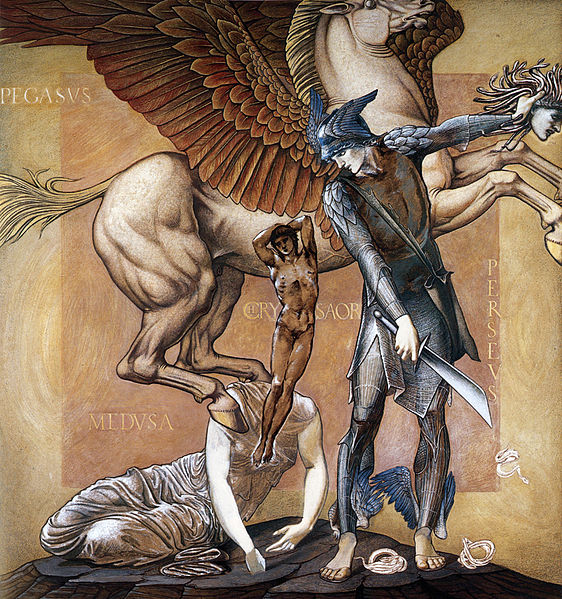CHRYSAOR IN GREEK MYTHOLOGY
Chrysaor was a minor figure in the tales of Greek mythology, named as a king of Iberia, Chrysaor was a figure who linked the adventures of two great heroes, Perseus and Heracles.
Chrysaor Son of Medusa
|
Chrysaor was regarded as a son of Poseidon and the Gorgon Medusa; for it was said, in one version of the Medusa myth, that Medusa had been raped by Poseidon in the Temple of Athena. For this sacrilege, it was Medusa who was punished by the goddess, with Athena turning Medusa into the famed gorgon.
Medusa, though pregnant, could not give birth in the normal manner, and it was only when Perseus encountered the Gorgon, and cut off her head, that her offspring were born from the severed body. Famously, Pegasus, the winged horse was born from this wound, but less famously, was the fact that Chrysaor was also born at this time. |
Chrysaor was normally depicted as a giant, but the fact that he was born at the same time as the winged horse Pegasus, has also seen Chrysaor described as a winged boar.
Chrysaor the Golden BladeThe name Chrysaor is normally translated as “Golden-Blade” and so Chrysaor was normally depicted with a golden sword.
Chrysaor though, was also depicted as powerful king, ruler of a large kingdom, consisting of the Iberian Peninsula; thus, the name “Golden-Blade” may have referenced the agricultural output of his kingdom, with the “Blade” being wheat. |
|
Chrysaor Father of Geryon
Chrysaor was said to have been wed to the Oceanid Callirhoe, and from this union was born Geryon, the three-headed giant encountered by Heracles, when the hero drove off Geryon’s cattle.
Those that attempted to rationalise the mythological tales in antiquity, suggested though, that Chrysaor was not the father of a single son, but of three sons, who worked together as one, and were collectively known as Geryon.
Those that attempted to rationalise the mythological tales in antiquity, suggested though, that Chrysaor was not the father of a single son, but of three sons, who worked together as one, and were collectively known as Geryon.
|
|
Colin Quartermain - Chrysaor - 10th November 2019
